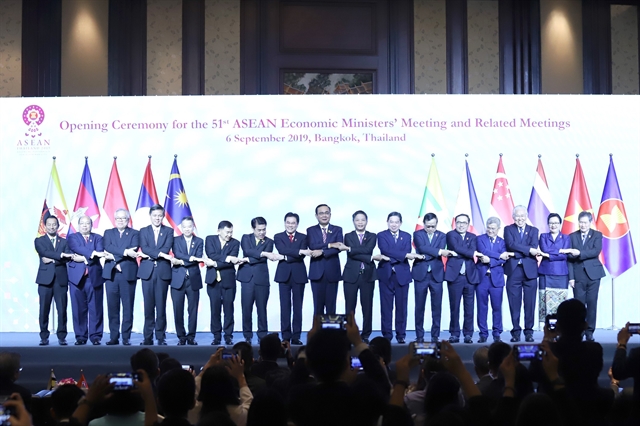The 51st ASEAN Economic Ministers’ Meeting (AEM 51) and related meetings officially opened in Bangkok on September 6, bringing together economic leaders from the 10 member countries of the Association of Southeast Asian Nations (ASEAN) and partner countries.

The 51st ASEAN Economic Ministers’ Meeting (AEM 51) and related meetings officially opened in Bangkok on September 6, bringing together economic leaders from the 10 member countries of the Association of Southeast Asian Nations (ASEAN) and partner countries.
Minister of Industry and Trade Tran Tuan Anh led a Vietnamese delegation to the event, scheduled to last until September 10.
In his opening remarks, Thai Prime Minister Prayut Chan-o-cha recalled the dream of ASEAN founding members 52 years ago of turning the grouping into an area of political stability and socio-economic development.
If no joint efforts were made in building the ASEAN Community, there would not have been such a strong bloc, the host leader stressed.
Thailand’s Deputy Prime Minister and Minister of Commerce Jurin Laksanawisit, who is also AEM 51 Chair, said as ASEAN’s rotary chair in 2019, Thailand had carried out the grouping’s economic development plan in accordance with the set roadmap.
The AEM 51 will discuss the bloc’s economic and trade cooperation priorities in 2019 proposed by Thailand and review the realisation of commitments included in ASEAN agreements.
Delegates will focus on issues such as competitiveness policies, consumer protection, intellectual property, e-commerce and support for micro, small- and medium-sized enterprises (MSMEs), among others.
They will also review the implementation of free trade agreements (FTAs) between the 10-member group and its partners including India, China, the Republic of Korea, Japan, Australia and New Zealand, as well as orientations to upgrade these existing FTAs in the future.
The ministers will look into cooperation between ASEAN and other partners such as Canada, Russia and the US, and set forth orientations to step up the partnerships.
Within the framework of the AEM 51, there will be related meetings, including the 33rd ASEAN Free Trade Area Council Meeting, the 22nd ASEAN Economic Ministers-ASEAN Investment Area (AEM-AIA) Council Meeting, and consultations between ASEAN and its partner countries.
The seventh Regional Comprehensive Economic Partnership (RCEP) Ministerial Meeting will be held to debate the target of concluding the RCEP agreement by the end of this year as set at the second RCEP Summit in Singapore last November.
Minister Anh told the Vietnam News Agency on the sidelines of the AEM 51 that Viet Nam was to sign the ASEAN Trade in Services Agreement (ATISA), aiming to promote trade and service liberalisation in the grouping.
The ASEAN has become one of Viet Nam’s major economic-trade partners, with trade revenue increasing from US$5.9 billion in 1996 when Viet Nam joined the ASEAN Free Trade Area to nearly $56.3 billion last year.
The integration into the ASEAN economy has brought about positive impacts for Viet Nam’s exports, helped local businesses improve their competitiveness and created changes in building and perfecting policies, laws and procedures regarding investment, towards an open and transparent business environment, thus contributing to luring more foreign investments.
Anh said Viet Nam was stepping up preparations for its ASEAN Chairmanship in 2020, adding that his ministry had coordinated with relevant ministries and agencies to devise approaches, topics and priorities of the economic pillar in the year. — VNS





